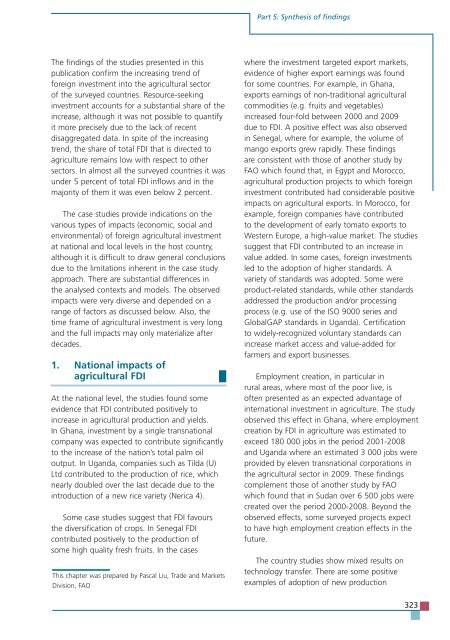TRENDS AND IMPACTS OF FOREIGN INVESTMENT IN DEVELOPING COUNTRY AGRICULTURE
TRENDS AND IMPACTS OF FOREIGN INVESTMENT IN DEVELOPING COUNTRY AGRICULTURE
TRENDS AND IMPACTS OF FOREIGN INVESTMENT IN DEVELOPING COUNTRY AGRICULTURE
You also want an ePaper? Increase the reach of your titles
YUMPU automatically turns print PDFs into web optimized ePapers that Google loves.
The findings of the studies presented in this<br />
publication confirm the increasing trend of<br />
foreign investment into the agricultural sector<br />
of the surveyed countries. Resource-seeking<br />
investment accounts for a substantial share of the<br />
increase, although it was not possible to quantify<br />
it more precisely due to the lack of recent<br />
disaggregated data. In spite of the increasing<br />
trend, the share of total FDI that is directed to<br />
agriculture remains low with respect to other<br />
sectors. In almost all the surveyed countries it was<br />
under 5 percent of total FDI inflows and in the<br />
majority of them it was even below 2 percent.<br />
The case studies provide indications on the<br />
various types of impacts (economic, social and<br />
environmental) of foreign agricultural investment<br />
at national and local levels in the host country,<br />
although it is difficult to draw general conclusions<br />
due to the limitations inherent in the case study<br />
approach. There are substantial differences in<br />
the analysed contexts and models. The observed<br />
impacts were very diverse and depended on a<br />
range of factors as discussed below. Also, the<br />
time frame of agricultural investment is very long<br />
and the full impacts may only materialize after<br />
decades.<br />
1. National impacts of<br />
agricultural FDI <br />
At the national level, the studies found some<br />
evidence that FDI contributed positively to<br />
increase in agricultural production and yields.<br />
In Ghana, investment by a single transnational<br />
company was expected to contribute significantly<br />
to the increase of the nation’s total palm oil<br />
output. In Uganda, companies such as Tilda (U)<br />
Ltd contributed to the production of rice, which<br />
nearly doubled over the last decade due to the<br />
introduction of a new rice variety (Nerica 4).<br />
Some case studies suggest that FDI favours<br />
the diversification of crops. In Senegal FDI<br />
contributed positively to the production of<br />
some high quality fresh fruits. In the cases<br />
This chapter was prepared by Pascal Liu, Trade and Markets<br />
Division, FAO<br />
Part 5: Synthesis of findings<br />
where the investment targeted export markets,<br />
evidence of higher export earnings was found<br />
for some countries. For example, in Ghana,<br />
exports earnings of non-traditional agricultural<br />
commodities (e.g. fruits and vegetables)<br />
increased four-fold between 2000 and 2009<br />
due to FDI. A positive effect was also observed<br />
in Senegal, where for example, the volume of<br />
mango exports grew rapidly. These findings<br />
are consistent with those of another study by<br />
FAO which found that, in Egypt and Morocco,<br />
agricultural production projects to which foreign<br />
investment contributed had considerable positive<br />
impacts on agricultural exports. In Morocco, for<br />
example, foreign companies have contributed<br />
to the development of early tomato exports to<br />
Western Europe, a high-value market. The studies<br />
suggest that FDI contributed to an increase in<br />
value added. In some cases, foreign investments<br />
led to the adoption of higher standards. A<br />
variety of standards was adopted. Some were<br />
product-related standards, while other standards<br />
addressed the production and/or processing<br />
process (e.g. use of the ISO 9000 series and<br />
GlobalGAP standards in Uganda). Certification<br />
to widely-recognized voluntary standards can<br />
increase market access and value-added for<br />
farmers and export businesses.<br />
Employment creation, in particular in<br />
rural areas, where most of the poor live, is<br />
often presented as an expected advantage of<br />
international investment in agriculture. The study<br />
observed this effect in Ghana, where employment<br />
creation by FDI in agriculture was estimated to<br />
exceed 180 000 jobs in the period 2001-2008<br />
and Uganda where an estimated 3 000 jobs were<br />
provided by eleven transnational corporations in<br />
the agricultural sector in 2009. These findings<br />
complement those of another study by FAO<br />
which found that in Sudan over 6 500 jobs were<br />
created over the period 2000-2008. Beyond the<br />
observed effects, some surveyed projects expect<br />
to have high employment creation effects in the<br />
future.<br />
The country studies show mixed results on<br />
technology transfer. There are some positive<br />
examples of adoption of new production<br />
323


